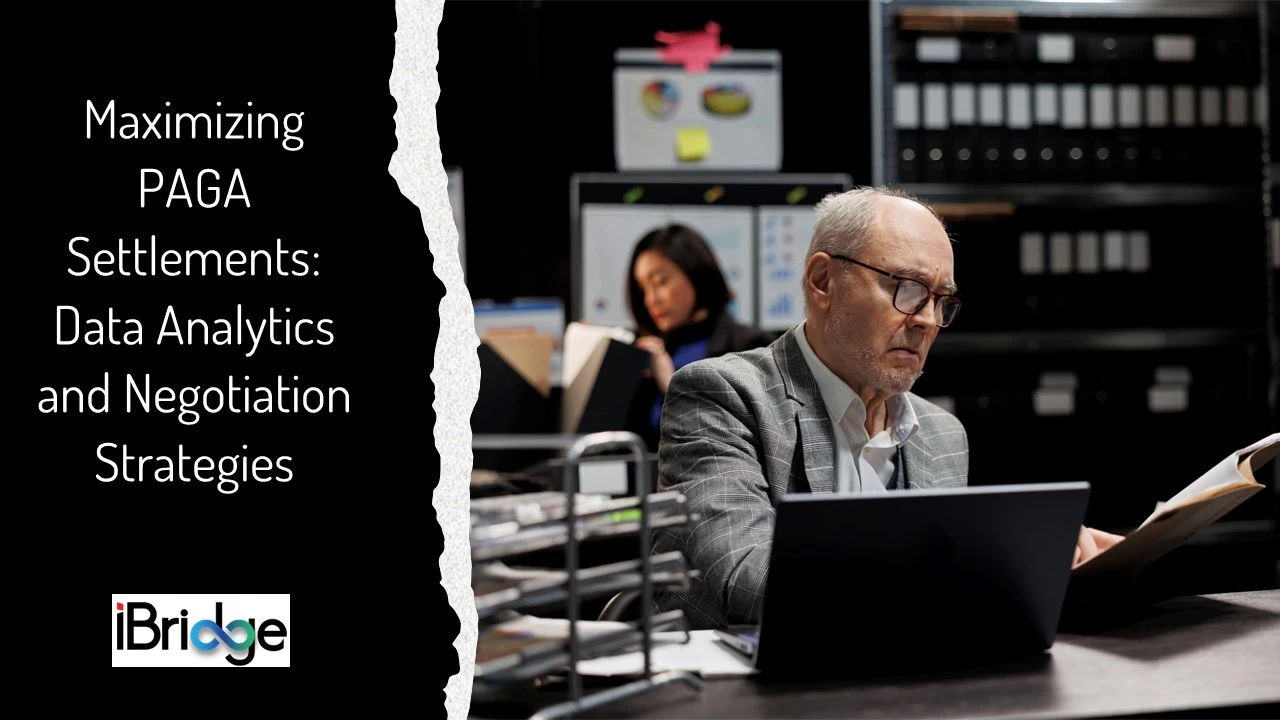The legal landscape is no stranger to technological advancements, and one area that’s witnessing a profound transformation is PAGA (Private Attorneys General Act) litigation. This legislation, unique to California, empowers employees to act as “private attorneys general” to enforce labor laws. In recent years, the legal community has increasingly turned to artificial intelligence (AI) and predictive analytics to navigate the complexities of PAGA cases.
This article explores the evolving role of AI and predictive analytics in PAGA litigation, shedding light on how machine learning can help law firms predict potential violations, plan litigation strategies, and ultimately reshape the future of labor law enforcement.

The Challenge of PAGA Litigation
PAGA cases are notoriously complex, often involving multiple violations, large datasets, and many claimants. The challenges are substantial for law firms representing either side in these cases. Identifying violations, calculating penalties, and formulating litigation strategies that stand up in court requires a deep understanding of labor laws and meticulous data analysis.
Traditionally, this process has been labor-intensive and time-consuming, with legal teams poring over extensive documentation and manually sifting through data. This is where AI and predictive analytics come into play, revolutionizing how PAGA litigation is approached.

The Power of AI in PAGA Litigation
- Predicting Potential Violations: AI algorithms can analyze historical data to identify patterns and trends, allowing law firms to predict potential labor law violations. By examining factors like employee work hours, breaks, and wage calculations, AI can flag areas where violations are likely to occur.
- Automated Data Extraction: AI-powered tools can sift through vast amounts of data, extracting relevant information quickly and accurately. This reduces the time and effort required for discovery and ensures that critical evidence is not overlooked.
- Calculating Damages: Calculating potential damages in a PAGA case is complex. AI can precisely handle these calculations, factoring in various variables such as unpaid wages, penalties, and interest to arrive at accurate figures.
- Strategic Decision Support: AI can provide valuable insights that inform strategic decisions. For example, it can predict the likely outcome of a case based on historical data, allowing law firms to assess the risks and benefits of pursuing litigation or settlement.

Predictive Analytics: A Game Changer
- Identifying High-Risk Areas: Predictive analytics can help law firms identify high-risk areas within an organization where labor law violations are more likely to occur. This allows for proactive compliance measures to be implemented.
- Optimizing Litigation Strategies: By analyzing data from previous PAGA cases, predictive analytics can guide law firms in formulating more effective litigation strategies. This includes understanding which arguments are likely to be successful and how to allocate resources efficiently.
- Reducing Litigation Costs: Predictive analytics can help law firms assess the potential costs of litigation, including legal fees, penalties, and settlements. This information allows for better cost-benefit analysis and may lead to more cost-effective resolutions.

Case Study: The AI-Powered Advantage
To illustrate the impact of AI and predictive analytics in PAGA litigation, consider the following case study:
Background: A large retail chain faced a PAGA lawsuit brought forth by a group of employees alleging widespread wage and hour violations, including unpaid overtime, missed breaks, and inaccurate wage calculations.
AI Implementation: The law firm representing the employees used AI to analyze a vast dataset, including employee timesheets, payroll records, and historical data from the retail chain’s workforce. The AI system detected patterns of wage violations, identifying employees who had consistently worked overtime without proper compensation.
Predictive Analytics Strategy: Predictive analytics were applied to assess the potential damages if the case went to trial. The analysis revealed that the damage could be substantial, significantly exceeding the settlement costs.
Outcome: Armed with this AI-powered analysis and predictive insights, the law firm entered settlement negotiations with the retail chain. The AI-generated data provided compelling evidence of the violations and the potential financial consequences. As a result, the case was settled out of court, delivering a favorable outcome for the employees without a protracted legal battle.

The Ethical Consideration
The integration of AI and predictive analytics in PAGA litigation raises ethical considerations. Privacy and data security are paramount when handling sensitive employee information. Law firms must ensure that they comply with all relevant privacy laws and regulations and implement robust data protection measures to safeguard confidential data.

The future of PAGA litigation is undeniably intertwined with artificial intelligence and predictive analytics. These technologies can transform the landscape, making the identification of violations more accurate, the calculation of damages more precise, and litigation strategies more effective. Law firms that harness the power of AI and predictive analytics will likely gain a competitive advantage in navigating the complex terrain of PAGA litigation. As technology continues to advance, it is imperative for legal professionals to embrace these tools responsibly and ethically, ensuring that they serve as allies in the pursuit of justice and labor law adherence in the modern era.
iBridge Solutions is a game-changer for PAGA law firms seeking innovative technology solutions and services. With a deep understanding of the intricate demands of Private Attorneys General Act (PAGA) litigation, iBridge offers tailored tools and expertise that empower law firms to streamline their investigations and documentation processes. Our comprehensive services include cutting-edge e-discovery solutions to identify critical evidence swiftly, data analytics to extract valuable insights from complex datasets, and state-of-the-art case management systems for efficient workflow organization.

Notably, iBridge has played an instrumental role in helping law firms successfully complete over 100 PAGA cases in the last 12 months alone, a testament to our commitment to excellence and the tangible results they bring to the legal landscape. iBridge’s commitment to data security and ethical considerations ensures that PAGA law firms can harness technology’s full potential while maintaining the highest standards of confidentiality and compliance. With iBridge as a partner, PAGA law firms can confidently navigate the digital age of litigation, improving their effectiveness and ultimately achieving better outcomes for their clients.
Hi, this is Ethan Hayden, Legal Project Manager and Attorney at iBridge. We at iBridge specialize in helping law firms achieve better project efficiency by leveraging a unique combination of computing and human intelligence. By automating repetitive tasks and streamlining workflows, we free up valuable time for attorneys to focus on what they do best – providing quality legal services to their clients.
We welcome the opportunity to discuss how we can help your firm achieve its goals and improve its bottom line.
Contact Us
Reach out today to schedule a discussion with an iBridge team member to learn how we can help your business in terms of growth and digital transformation


















































